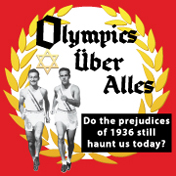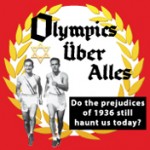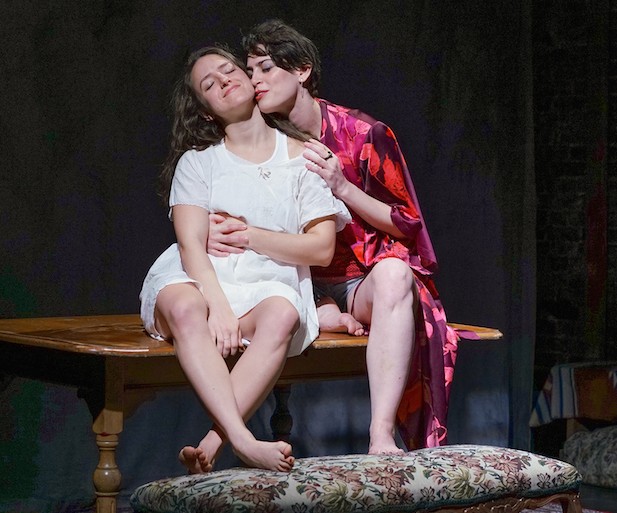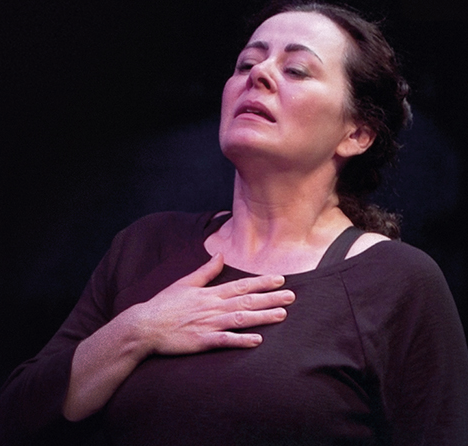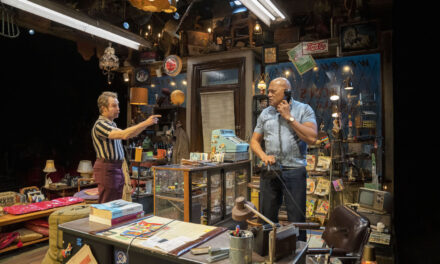NY Theater Review By Elizabeth Ahlfors
Greeting the audience are Adolph Hitler’s words about the 1936 Olympics in Berlin projected on the St. Luke’s Theater screen. “The sportive knightly battle awakens the best human characteristics. It doesn’t separate, but unites the combatants in understanding and respect. It also helps to connect the countries in the spirit of peace.That’s why the Olympic Flame should never die.” Unfortunately, in Olympics Über Alles, a new play by Samuel J Bernstein and Marguerite Krupp. the irony of “respect” and “spirit of peace” fails to ignite as forcefully as it should.
Olympics Über Alles centers on the “Nazi Olympics” and contains the hope, fear, and inspiration necessary for a challenging drama, with pre-World War II politics twisted into anti-Semitism and injustice. While truth struggles with personal commitments, this muddled book, overburdened with brief scenes and unclear characters, blunts the emotional and dramatic core from touching the heart.
Directed by Debra Whitfield, Olympics Über Alles tells of Jewish-American runners Marty Glickman and Sam Stoller who had traveled to Berlin as part of the U.S. track team. On the morning of the trial heats for the 400-meter relay, they were suddenly cut from the team. Head coach said there were rumors that the Germans were saving their best sprinters for the relay and Glickman and Stoller were replaced by Jesse Owens and Ralph Metcalfe. When Owens said, “Coach, I’ve won my 3 gold medals. I’m tired. I’ve had it. Let Marty and Sam run, they deserve it,” the assistant coach replied, “You’ll do as you’re told.” It was a devastating, life-altering moment for the two young athletes and it was an event ignored by history.
An older Marty Glickman (Stewart A. Schneck) does much of the narration in this show. Since the event, Glickman has been outspoken about the Olympics. He argued with the coaches, vowing he would be back for the next games. Unfortunately, the second World War prevented the Olympics of 1940 and 1944. Over the following years, Glickman made a name as a radio sportscaster. The other Jewish athlete, Sam Stoller, sat silently at the meeting. He vowed he would never run again. Not much is mentioned about Stoller in this play but accounts show that he did return to the sport several years later and won major competitions.
Why these young men were denied their chance to compete is the recurrent argument throughout the storyline. Apparently, behind the decision were Nazi and American officials, including Avery Brundage, president of the International Olympic Committee. (The Holocaust Museum points out that two years later, Hitler gave Brundage’s construction company the contract to build the German embassy in Washington, D.C.). In addition, influential Jewish and international organizations called for boycotts of the games because German Jewish athletes were barred.
Were Glickman and Stoller cut because they were Jews, as Glickman and others believe? Was it a political agreement to placate the German government, openly involved in anti-Jewish atrocities? Was a more cunning international anti-Semitism also to blame? American discrimination is featured in an overly emphatic example of a bigoted father, drawn so broadly that he would be hateful on many counts. Subtle examples of corporate, societal and government inequality would be more effective.
The book and the play’s direction is further confused by fast-forward leaps in numerous short scenes from past to the present. A capable cast of eight is busy playing various characters with awkward identifications. The focus wavers from Glickman’s narration to a secondary contemporary spotlight on Professor Steve Feinstein (Tim Dowd), a Jewish scholar and Kate McCarthy (Amy Handra), an Irish Catholic museum curator. Feinstein wants the museum to include the 1936 Olympics Glickman-Stoller incident in its upcoming minorities exhibit. Feinstein and McCarthy’s personal and scholastic struggles involve truth and their backgrounds.
Duane Pagano designed a set of panels that are easily moved by actors for the quick moving scenes. Sound and projections displaying Olympics moments are by Paul Bourgeois.
While there is intriguing substance and moments of thoughtful depth, an overburden of pedantic inserts and vaguely developed characters keep the production from evolving into a gripping theatrical experience.
Olympics Über Alles opened August 27, 2014 and has been extended to Oct. 29, 2014. Performances will be Wednesday matinees at 2PM, Thursday evenings at 8pm, and Sunday matinees at 1PM. St. Luke’s Theatre, 308 W. 46th St., New York, NY 10036. Ticket Price: $39.50-$60. Telecharge: 800-432-7250 or 212-239-6200; http://www.telecharge.com. The show runs two hours, 20 minute, including intermission.


